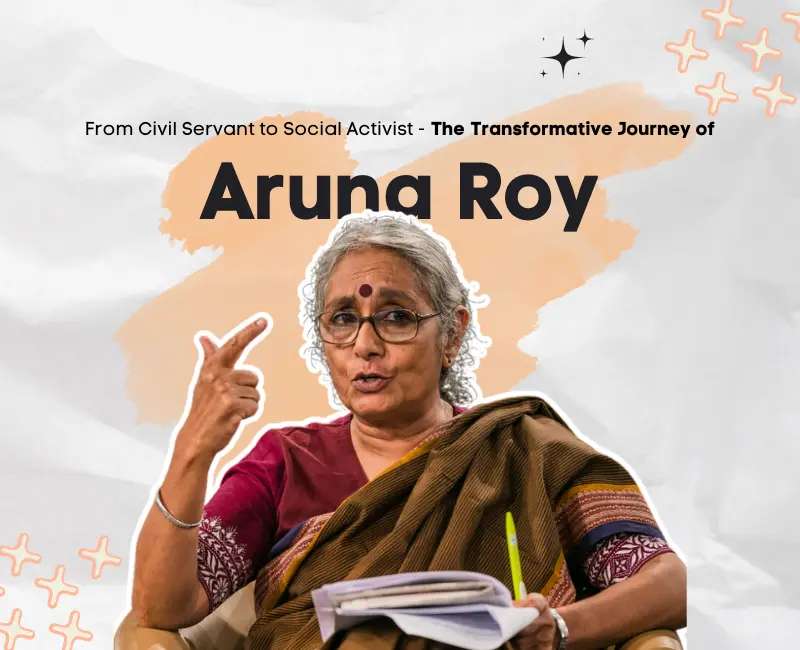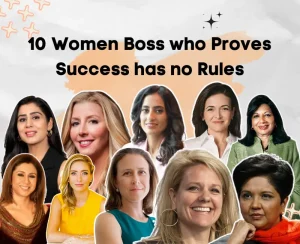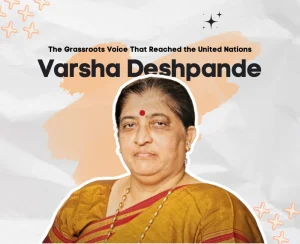From Civil Servant to Social Activist – The Transformative Journey of Aruna Roy

In a society where women frequently face societal barriers and restrictions, Aruna Roy has emerged as a symbol of hope and change for women and farmers. She is a prominent Indian social activist, professor, politician, and former civil servant who dedicated her life to the betterment of society. She is the president of the National Federation of Indian Women and co-founder of the Mazdoor Kisan Shakti Sangathan. Aruna Roy’s journey from an IAS officer to co-founder of Mazdoor Kisan Shakti Organization (MKSS) illustrates the power of grassroots action in solving the issues that people face in India. Her unwavering commitment to transparency, accountability, and the rights of poor and vulnerable groups has had an indelible impact on India’s socio-political environment. Have a look at the transformative Journey of Aruna Roy from a Civil Servant to an impactful Social Activist who has reshaped the public accountability in India.
Early Life and Education: A Glimpse into Her Past
Aruna Roy was born on June 6, 1946, in Chennai, Tamil Nadu, into a Tamil Brahmin family. She was born as Hema and E.D. Jayaram’s eldest child and had two sisters and one brother. During her postgraduate studies at Delhi University, she met a social worker, Sanjit Roy, whom she married in 1970.
Education: Schooling and College
Aruna Roy was sent to Aurobindo Ashram, a spiritual commune in Pondicherry, while her family moved to New Delhi. After a year, she expressed her unhappiness and joined her family in New Delhi, where she completed the rest of her education. She completed her primary education at Bharatiya Vidya Bhavan school in New Delhi and later pursued her post-graduation in English literature at the Indraprastha College, University of Delhi. Along with that, she learned art, Bharat Natyam style classical dance, and Carnatic classical music for two years. Moreover, she also went to a convent school to learn French, as her parents insisted.
Civil Services: Breaking the Societal Norms
After pursuing a postgraduate degree, she didn’t want to become a homemaker; however, her options were limited to teaching and journalism only. She taught in the same college for a year and decided to become an IAS officer. She attempted and passed the Indian Administrative Service (IAS) examination in 1967 when she was just 21.
She started working as a civil servant in IAS in 1968 in Tamil Nadu and later shifted to rural areas called North Arcot. While serving there, she experienced the life and struggles of rural communities.
Later, she worked as a sub-collector and then a sub-divisional magistrate in Delhi. There, she realized the high levels of corruption in government activities when she dealt with student unrest and election cases. The worst happened when she joined as deputy secretary of finance in 1973. She discovered the dark side of IAS that completely contradicted her expectations.
Later, she was promoted to the position of Secretary to the Lieutenant Governor of Delhi. However, she resigned from IAS services in 1974 and decided to dedicate her life to social and political campaigns.
Career and Activism: From Bureaucrat to Grassroots Leader
Despite her efforts to adjust and bring change, the slow, cumbersome, and corrupted ecosystem of the civil world forced her to quit her job. Her resignation from the IAS marked the beginning of her transformative journey as a social activist. After leaving her IAS post, Aruna Roy joined her husband, Sanjit Roy, at Barefoot College’s Social Work and Research Centre, a social organization he formed in Tiloniya, Rajasthan.
Early Beginnings: First Steps towards Social Work
Barefoot College was founded by Sanjit Roy for the social and economic development of the Tiloniya village. Aruna Roy connected with people on the ground level, understood their problems related to electricity, water, etc., and finally decided to join her husband in the mission of Tiloniya’s development.
She worked on issues related to rural development and women’s empowerment. Over the years, Barefoot College has implemented many technologies, including solar electricity, in many villages, and educating rural people on the usage of these sophisticated systems.
Interceding Years: Turning to Grassroots Activism
From 1983 to 1987, Aruna Roy collaborated with tribal and women’s groups in Rajasthan and neighboring states. Her goal was to empower communities to demand rights and hold the government accountable. She worked with grassroots organizations and provided them with guidance and support to strengthen their capabilities.
In 1985, she organized the Mahila Mela (Women’s Festival) in Rajasthan, focusing on the issues of poor rural women. This festival marked one of the most significant shifts in people’s attitudes toward violence against women, with blame placed on perpetrators rather than victims.
By 1987, her efforts extended beyond Rajasthan, amplifying the voices of marginalized communities. Finally, with the help of like-minded people, she decided to build a new organization for grassroots empowerment.
Mazdoor Kisan Shakti Sangathan (MKSS): Empowering rural laborers and farmers
In 1990, Aruna Roy moved to Devdungri and co-founded Mazdoor Kisan Shakti Sangathan (MKSS) along with Nikhil Dey and Shankar Singh. MKSS is an organization focused on fighting for the rights of poor farmers and laborers.
She and her team started raising voices for the people who used to work for the rich and wealthy farmers at a low pay. Her aim was “right pay for the amount of work done” and “accountability of the local governments.”
Under her leadership, MKSS combated ground-level corruption and advocated for public officers’ accountability in government funding situations.
She has also worked on campaigns to ensure the poor have access to constitutional rights for equality and justice, including the Right to Work, Food Security, and the PUCL.
Right to Information Act (2005): Transparency via People’s Hearings
The Campaign for Fair and Equal Pay evolved into the broader movement for India’s Right to Information Act. Aruna Roy was a crucial player in the right-to-information movement, which eventually resulted in the Right-to-Information Act in 2005. Aruna Roy co-founded the National Campaign for People’s Right to Information (NCPRI) in 1996 to advocate for and maintain the RTI framework.
It started when Sonia Gandhi, the current president of INC, learned about MKKS and Aruna Roy, a women activist, being its founder. She praised her work, and Aruna leveraged this chance by interlinking the Right to Information with other issues like women’s employment, livelihood, and empowerment.
In 2000, the Congress-led government in Rajasthan passed the Rajasthan Right to Information Bill with the assistance of Sonia Gandhi. Later, in 2004, the congress government won the elections, and Aruna Roy was inducted into the National Advisory Committee (NAC). Her role was to draft the Right to Information Act, which the Indian Parliament finally approved in 2005. She was a member of the Indian National Advisory Council till 2006 and later again from 2010-2013.
Later Career (2004 – Present): Continuing the Legacy of Impact
- Aruna Roy raised her voice for incidents related to the country’s increase of intolerance.
- She was involved in the Right to Information Act, the Right to Work (the Mahatma Gandhi National Rural Employment Guarantee Act), and the Right to Food.
- Aruna Roy was influential in shaping the National Rural Employment Guarantee Act (NREGA), which guarantees 100 days of employment to rural households.
- She was involved in a campaign for a non-contributory pension for unorganized sector employees.
- She was outspoken in her appeal for the enactment of the Grievance Redressal Act and the Whistleblowers Protection Act as a member of the NCPRI.
- In 2016, Aruna Roy was appointed as a Professor of Practice in Global Governance at McGill University in Montreal
- Aruna Roy and the MKSS group published “The RTI Story: Power to the People,” a book that chronicles the history of the Right to Information campaign in India, in 2018.
- Currently, she is a prominent participant in several social movements and is serving as President of the National Federation of Indian Women.
Awards and Recognition: Honors for Outstanding Contributions
Aruna Roy has received a lot of awards for her exceptional work in promoting transparency and accountability and her advocacy for the rights of labor, farmers, and women. Here is a list of some of the reputed awards and recognition she got:
- In 2000, Aruna Roy was honored with the Ramon Magsaysay Award for Community Leadership in recognition of her noteworthy efforts in empowerment and social justice.
- In 2010, she won the Lal Bahadur Shastri National Award for Excellence in Public Administration, Education, and Management and the Nani Palkiwala Award.
- In 2011, TIME Magazine listed her as one of the 100 most influential people in the world.
- She received the 1991 Times Fellowships Award with the Mazdoor Kisan Shakti Sangathan in recognition of her efforts to promote rural workers’ rights, social justice, and development.
- She was included in the Times of India’s September 2017 list of 11 human rights activists whose life’s work is to give others a dignified existence.
- In 2016, she was appointed a professor of global governance at McGill University in Montréal.
Conclusion
Aruna Roy’s journey from civil servant to renowned social activist serves as an example for all women who aspire to shatter barriers and achieve great things. She started with her dream of becoming an IAS officer, which exposed her to corruption, red tape, and the dark side of government. This encouraged her to educate people about their rights and hold government officials accountable for various things. Not only that, but she has successfully created Mazdoor Kisan Shakti Sangathan (MKSS) and implemented the Right to information, work, and food also. Her work left an incredible mark on the landscape of social activism in India, helping and inspiring countless people to raise their voices for the right.


